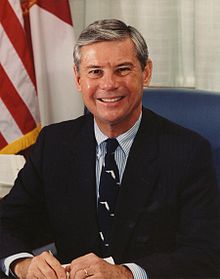Bob Graham 2004 presidential campaign
| Bob Graham 2004 presidential campaign | |
|---|---|
Governor of Florida (1979–1987) | |
| Affiliation | Democratic Party |
| EC formed | February 27, 2003 |
| Announced | May 6, 2003 |
| Suspended | October 6, 2003 |

Bob Graham was a candidate for President of the United States in the 2004 Democratic Party presidential primaries.
At the time of the campaign, Graham was the senior
Background
Graham's name had a long presence in presidential and vice presidential politics, due to his popularity as
He also harbored Presidential ambitions for years.Graham's relatively low-key national profile was significantly raised after the
He also represented a key swing state, Florida, which decided the 2000 presidential election results. Winning Florida four years later might possibly give Democrats the White House. Graham had won re-election in 1998 in a landslide (with 62.47% of the vote),[3] and had never lost any election before (many of them by a similarly high margin).[4]
Graham's potential nomination was considered by many as appealing, due to his moderate stance. He also would appeal to the Democratic core due to his opposition to the early Iraq War (he voted against the authorization of use of military force in 2002[5]), and his pro-environmental record. Senator Graham held a reputation as a bright man in politics, with a good sense of humor, and he was never implicated in any scandal.
Among his political cons, however, were his cited lack of charisma, his relatively older age (67 in 2004) and recent medical problems.
Campaign
His campaign began on February 27, 2003, when he filed papers to form an exploratory committee, after delaying his intent to announce on February 3 due to having heart surgery on January 31.
His candidacy did not find ground, overshadowed by earlier front-runners. He performed very poorly in polls, regularly taking last place. He also cited huge fundraising problems. Howard Dean took the role of key opposition against the Iraqi war among Democratic candidates, even if Graham had been initially predicted for this role[7] (he was the only one of the 2004 Democratic candidates who voted against authorization).
He dropped out on October 6, 2003, the first major candidate to do so, and did not win a single vote in the primaries.[8]
Graham was mentioned as a possible running-mate for John Kerry, an eventual nominee (mostly in order to win Florida), but the Massachusetts senator finally selected John Edwards. Graham decided to not seek a fourth Senate term and retired from active politics on January 3, 2005.
Endorsements
Members of Congress
- Senator
- Representative Allen Boyd of Florida[9]
- Representative Corrine Brown of Florida[9]
- Representative Jim Davis of Florida[9]
- Representative Peter Deutsch of Florida[9]
- Representative Alcee Hastings of Florida[9]
- Representative Kendrick Meek of Florida[9]
- Former Representative Jim Bacchus of Florida[9]
- Former Representative
Other individuals
- Former
- Former Speaker of the Florida House of Representatives Jon Mills[9]
- State Senate Minority Leader Ron Klein of Florida[9]
- Chairman of the Florida Democratic Party Scott Maddox[9]
- Miami, Florida[9]
- Former Florida First Lady Rhea Chiles[9]
- Florida State Senator Rod Smith[9]
References
- ^ THE 1992 CAMPAIGN: Democrats; CLINTON SELECTS SENATOR GORE OF TENNESSEE AS RUNNING MATE – New York Times
- ^ Gore, Lieberman prepare for public debut of Democratic ticket – August 7, 2000 Archived August 13, 2007, at the Wayback Machine
- ^ Our Campaigns – FL US Senate Race – Nov 03, 1998
- ^ Our Campaigns – Candidate – D. Robert "Bob" Graham
- ^ U.S. Senate: Legislation & Records Home > Votes > Roll Call Vote
- ^ "Sen. Bob Graham- 2004 Presidential Candidate".
- ^ What Dean's Mojo Means To The Top Contenders – TIME
- ^ Our Campaigns – US President – D Primaries Race – Jan 13, 2004
- ^ a b c d e f g h i j k l m n o Politics1 – Profile of Sen. Bob Graham (D-FL) Archived July 24, 2008, at the Wayback Machine
- ^ "Wayne Mixson - $1,250 in Political Contributions for 2004".
